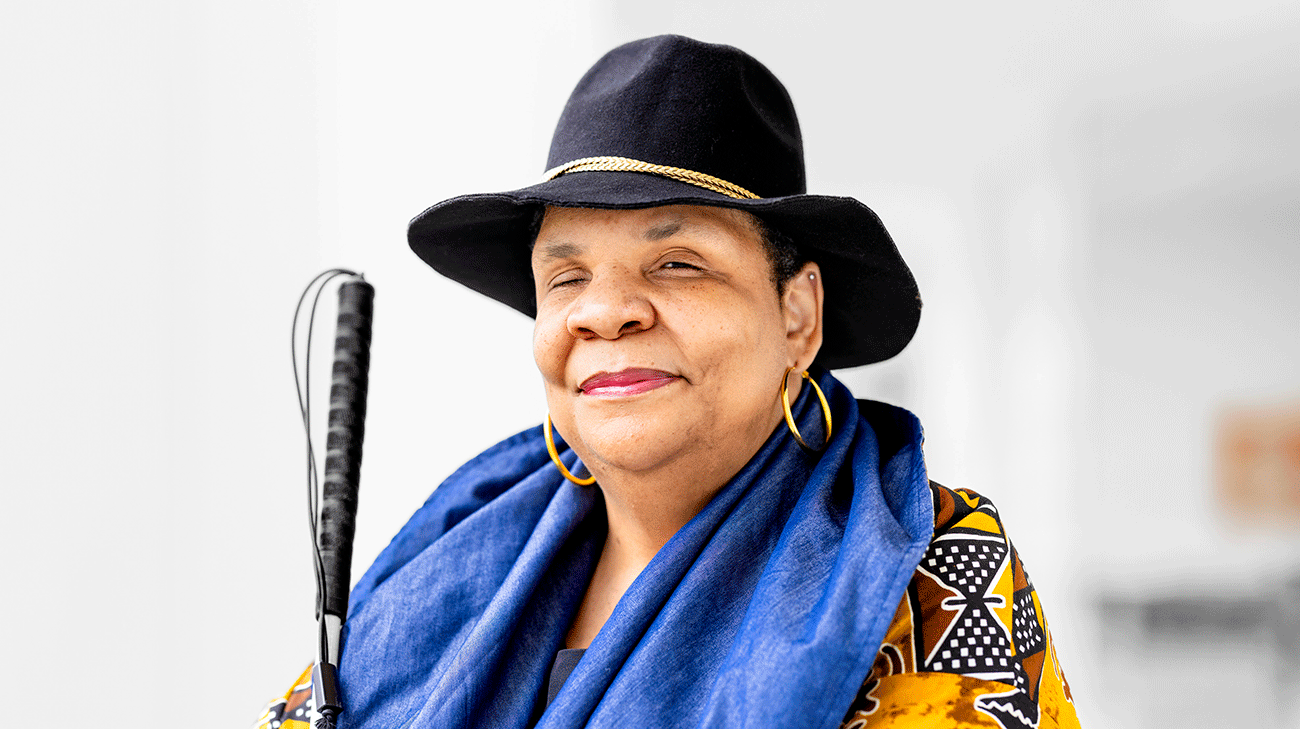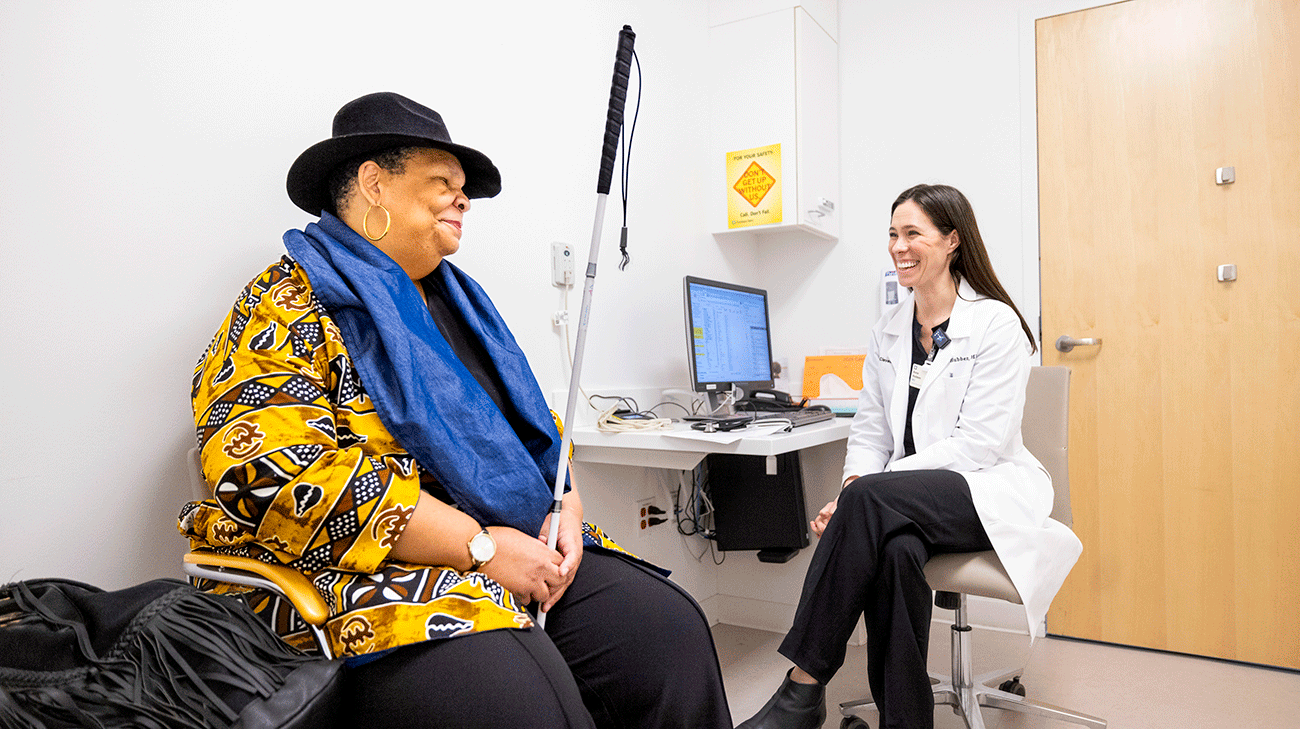
In May 2019, Willetta Tucker was in a coma and close to death. Encephalitis arising from the shingles virus had caused her brain to swell. She was rushed from a hospital in Toledo, Ohio, to Cleveland Clinic’s main campus.
“The shingles virus – varicella zoster – lives in the body after someone is infected with the chicken pox virus,” says Ryan Miller, DO, a Cleveland Clinic infectious disease specialist. “It was attacking Willetta’s brain and eyes. She was unresponsive, and I didn’t think she was going to make it. We gave her antiviral treatments, which saved her life, but there was nothing we could do to heal her eyes.”
Willetta does not remember this period, only waking up weeks later, back in Toledo, to complete darkness and paralysis. Through intense follow-up care and rehabilitation at Cleveland Clinic, she is able to walk again with the help of a cane. However, she is not expected to regain her sight.
Cases of shingles attacking the brain are rare, but can occur even in people with normal immune systems, Dr. Miller says. “It happens quickly and is difficult to diagnose. We don’t have a good test to identify it from the spinal fluid.”
Usually, people over the age of 50 are advised to get a shingles vaccine, but Willetta was just 44 years old at the time. “It’s so rare that I don’t want people to panic about this,” Dr. Miller cautions. “However, if you have a sudden vision change, you need to see somebody well-versed with back-of-the-eye problems.”
Willetta says her will to live was challenged in the early days of her recovery. “I woke up completely blind and paralyzed – at first, I could only bat my eyes. It took lots of prayer. It was a process, and many times, I didn’t want to wake up anymore because I thought my life was over. But I finally got the will to say, ‘I’m still a person and I’m gonna’ do this.’”

Willetta Tucker and Dr. Anne Hubben (Courtesy: Cleveland Clinic)
She relies on special transportation that takes her a few hours each way from Toledo to Cleveland Clinic for her appointments.
“You have no idea how hard it is when you have no sight and can only go by faith,” Willetta says. “Cleveland Clinic has been just angelic, from the time I get out of medical transportation to the time that I leave. They don’t just treat me as a patient, they treat me as a person. I’m talking about holding my hand, wiping my tears, investigating my issues, and providing pure encouragement. Cleveland Clinic transport, doctors, nurses and patient coordinators all have helped me with the process.”
In addition to her Cleveland Clinic physicians and physical therapists, she also credits her personal support system for her progress, including her mother, Mable Tucker; friends LuCynthia Jones, who provided her with a cellphone in case of emergency that helped restore her confidence and independence, and Samia Dixon; her medical transportation team in Toledo; and her insurance case worker.
Willetta has a mission of inspiring others through her own experience and efforts, she says. “My message I would like to share with others is ‘no matter what the journey is, no matter what you go through, you can get up. You can still smile. You can still love and be loved, and you can still be a productive part of society.’”
She says that she also wants to advocate for healthcare workers like herself, a former aide who provided therapeutic care for Alzheimer’s patients. She aims to raise awareness of the critical need for such care and to fight for better compensation for those who serve as a lifeline for people with disabilities.
Cleveland Clinic hematologist Anne Hubben, MD, a member of Willetta’s multidisciplinary medical team, is impressed by her progress and determination. “She has overcome immense challenges to get back to independence and health, and wants other patients to see there is a chance for positive outcomes at the end,” she says.
Dr. Miller agrees. “I tell her that she’s a miracle,” he says. “She’s learning Braille, and her memory, which she relies on, is fantastic. She’s using a cane and trying to compensate for what she lost. You have to be strong and a little stubborn. She’s a wonderful person who has gone through such a terrible event, and yet still smiles and has a great outlook.”
Willetta says that some illnesses “are so grueling and dehumanizing. That’s why I’m extremely appreciative of my care at Cleveland Clinic. It’s not just the body they’re treating, but also the spirit of the person with the illness. I have been treated holistically and with tender care.”
Related Institutes: Neurological Institute, Cleveland Clinic Cancer Center, Respiratory Institute

